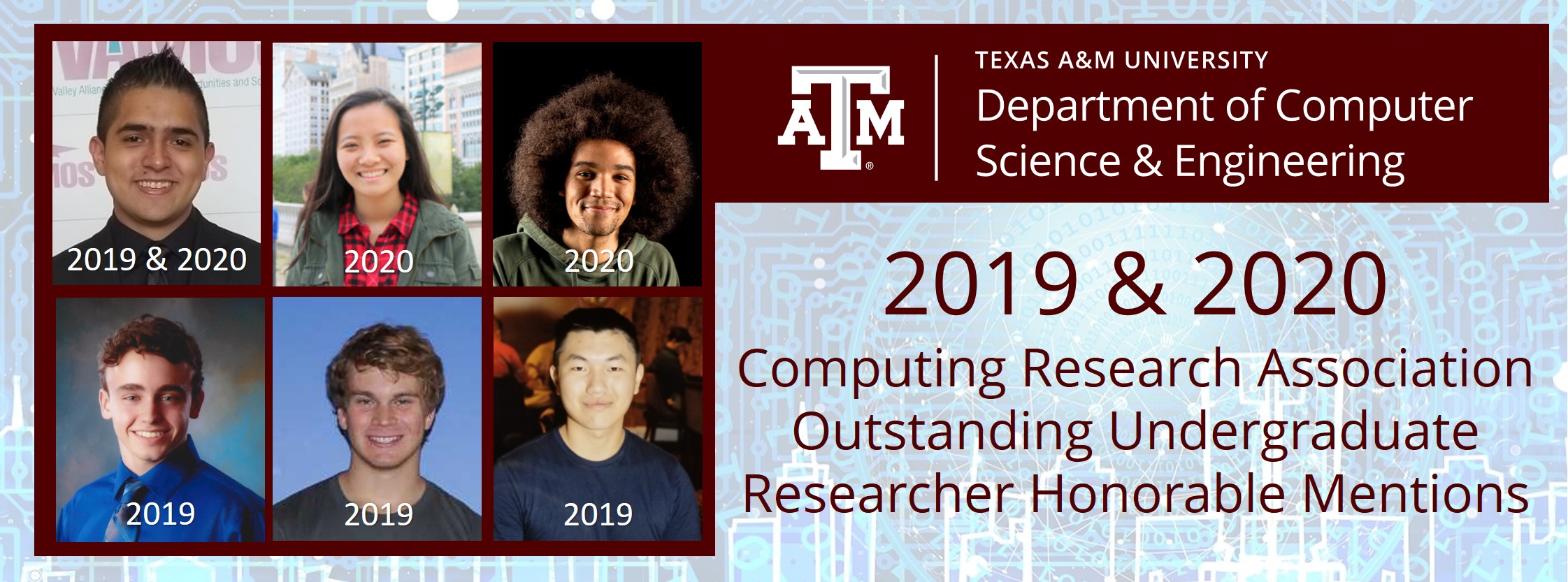
Seven awards over the last two years won by six undergraduate students from the Department of Computer Science and Engineering at Texas A&M University received honorable mentions in the Computing Research Association’s (CRA) Outstanding Undergraduate Researcher Awards: Angel Pina, Benton Guess, Justin Lovelace, Lina Zhang, Kexin Feng, and Reginald Frank. Five of the honored student awards are for students who have done research with the Sketch Recognition Lab (SRL) led by the director of the Institute for Engineering Education & Innovation, Dr. Tracy Hammond. Hammond said, “I am proud of the hard work and dedication demonstrated by these outstanding researchers and believe they will serve as role-models for future students.”
The CRA, a coalition of more than 200 North American organizations, recognizes exceptional undergraduate researchers from universities in the U.S. and Canada, for their potential in an area of computing research. The 2019 and 2020 awards were sponsored by Microsoft Research and Mitsubishi Electric Research Labs respectively.
Angel Pina
Angel Pina, who has now received honorable mentions for the second year in a row, is currently a Senior pursuing a Computer Science degree with a minor in Statistics at Texas A&M. As part of the SRL, Pina used the Python Scikit Learn package to perform machine learning and data analysis on eye-tracking data. His project was part of a National Science Foundation (NSF) funded grant that used eye-tracking to determine how likely an industry recruiter is to select a candidate while reviewing resumes. Pina said, “I have enjoyed working on this project and look forward to submitting a first-authored journal publication on this work with Dr. Hammond next month.”
Lina Zhang
Lina Zhang was honored in 2020 for her research on how users can recognize numerical values in messages from a wearable device using overlapping vibrotactile patterns. Zhang also worked on vibrotactile communication and haptics research at Texas A&M University as part of the Undergraduate Research Scholars program with Dr. Tracy Hammond as her thesis advisor along with mentors Josh Cherian and Dr. Paul Taele. Zhang said ‘I’m very honored to receive this award and grateful to have a community of mentors and educators that inspire me to pursue research”.
Benton Guess
Benton Guess was honored in 2019 for developing an automated system for grading the Rey-Osterrieth Complex Figure (ROCF) test while working at the Sketch Recognition Lab under Dr. Hammond. The ROCF test is an examination administered by neuropsychologists to assess the mental state of patients, testing visuospatial abilities, memory, attention, planning, working memory, and executive functions. Guess said his research dealt with “computers and psychology, which, in [his] perception, is an intersection where we will build the systems of the future.’’ Guess completed his thesis with Dr. Hammond, was mentored by Raniero Lara-Garduno and recently submitted a paper to Computer-Human Interaction (CHI) with his mentors on this work. Guess said “This was a very rewarding experience that let me not just learn about academic research, but also meaningfully contribute to the project. I really enjoyed getting to know the research process and development work which is very different from regular class projects”.
Justin Lovelace
Justin Lovelace was honored in 2019 for researching the intersection of natural language processing (NLP) and interpretable machine learning for medical research, including datasets from intensive care units to develop predictive models for readmission and mortality outcomes. Lovelace started in research early in his undergraduate career, first working with the Sketch Recognition Lab under Dr. Hammond as a freshman and sophomore, and then working with Dr. Bobak Jack Mortazavi in his later years. His research focuses on the development of machine learning models that handle structured, time-series data as well as unstructured text data in the form of medical notes, to estimate clinical outcomes after patients leave the ICU. This work and his undergrad thesis earned him an Outstanding Undergraduate Honors Thesis award in 2019. Dr. Mortazavi said, “I am thrilled that he joined Systems and Technology for Medicine and IoT (STMI) lab in 2018 and I know he will do great in his Carnegie Mellon University graduate program.’’
Reginald Frank
Reginald Frank was honored in 2020 for his research on synchronizing clocks in a distributed computer system, which needed to overcome uncertain delays in communication. Currently a senior with a dual major in computer science and applied mathematics working with Dr. Jennifer Welch and Dr. Dmitri Loguinov. Frank said, “It’s really incredible to get recognition for my work in parallel and distributed computing. I feel very fortunate to have worked with both of my advisors, and getting this recognition makes me want to work more to see where that might take me next.” Frank also won the 2018 Dean’s Excellence Award in Engineering.
Kexin Feng
Kexin Feng was honored in 2019 for researching the development of computational models of human behavior through signal processing and machine learning techniques with applications in well-being and education working with Dr. Theodora Chaspara. Feng, who is has been part of the HUman Bio-Behavioral Signals (HUBBS) Lab since Spring 2018 , said he wanted to “understand the connections between basic emotions… to help with diagnosing and alleviating mental health-related problems.’’ As part of his undergraduate work he published two conference papers and submitted one journal paper as a first-author.
